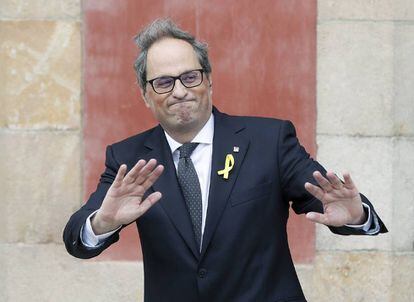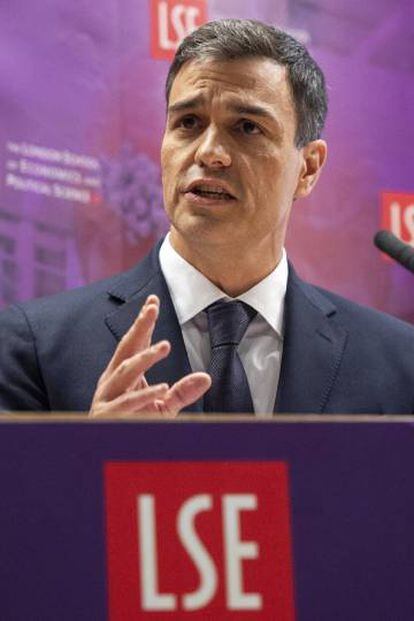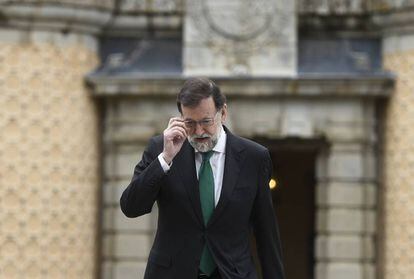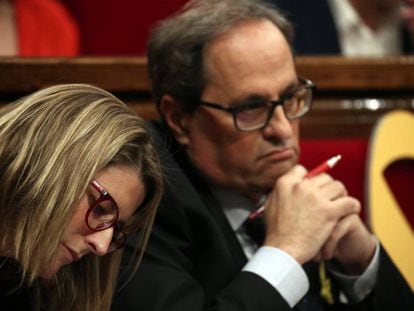Catalonia has a new premier, but for how long?
Quim Torra say his term of office will be transitional, and Madrid has to make decisions on direct rule

After five months of deadlock and three failed nominations, Catalonia has a new leader, but it is unclear how long he will remain in office.
Quim Torra, 55, has stated that he views his own position as temporary and that the legitimate premier of Catalonia is the ousted leader Carles Puigdemont, who is currently in Germany awaiting an extradition decision in connection with a rebellion probe in Spain.
Meanwhile, the Spanish government now has to decide about lifting Article 155 of the Constitution and returning self-rule to the region, with the possibility of revoking it again if Torra makes any moves outside the law.
Anxiety is not what the people who need to address such a complex situation should be feeling right now
Spanish PM Mariano Rajoy
And the small, radical CUP party, which abstained from supporting Torra because it feels that he may not be sufficiently committed to a Catalan republic, warns that he will be closely monitored.
“Mr Torra, I assure you that we will be on high alert,” said CUP leader Carles Riera, who suspects that the other two separatist parties may now be willing to respect the Spanish legal framework in exchange for more concessions from Madrid, rather than aim for a complete break.
Elections averted
Torra had been handpicked by ousted premier Carles Puigdemont to be the new nominee for the position. He was elected on Monday with 66 votes in favor from two separatist parties (Together for Catalonia and Catalan Republican Left) and 65 against from Ciudadanos, the Catalan Socialist Party, Catalunya en Comú-Podem and the Popular Party.

The appointment was made possible through the abstention of four CUP lawmakers, at a second round of voting that only required a simple majority of more yes than no votes. Torra had failed to secure an absolute majority in the first round on Saturday. Six separatist deputies who are in self-exile in other European countries or in pre-trial detention in Madrid voted by proxy.
“I am grateful for the vote and to President Puigdemont for his generosity. Visca Catalunya lliure (Long live a free Catalonia),” said Torra after the result was announced.
Torra’s nomination was aimed at preventing new elections in the region. For the first time, separatist parties produced a candidate who is not facing prosecution over the unilateral independence push. The three previous nominees are either in self-imposed exile (Puigdemont) or in pre-trial detention (Jordi Sànchez and Jordi Turull).
Failure to form a government by May 22 would have forced Catalans to go to the polls again. But in his public addresses, Torra has underscored that this is an “exceptional and provisional” situation and that his own term of office will be very limited. He has referred repeatedly to Puigdemont as the “legitimate” premier of Catalonia, and said that he plans to continue his predecessor’s efforts to build a Catalan republic and start a constituent process.
Madrid’s move
In this scenario, Spanish Prime Minister Mariano Rajoy is due to meet with Socialist Party leader Pedro Sánchez on Tuesday to discuss the new situation. On Thursday, he will meet with Albert Rivera, the head of Ciudadanos, which is currently leading voter intention polls. Ciudadanos was also the most-voted force at the Catalan elections of last December, although separatist parties collectively earned more seats.
Both the Socialists and Ciudadanos supported the application of Article 155 in late October, after the separatist parties in the Catalan parliament made a unilateral independence declaration. Now they have to discuss lifting it and whether it could be invoked again.
“It’s harder the first time than the second,” said José Luis Ábalos, the organization secretary for the Spanish Socialists. “Cooperating (with the government) again or ratifying a constitutional response does not represent an effort for us.”

“Gentlemen of the Spanish government: which day will you lift Article 155?” asked Eduard Pujol, the deputy speaker for Puigdemont’s Together for Catalonia group. “Mr Rajoy, Rivera and Sánchez, if you were once brave enough to impose an unfair norm, be brave now and honor your word.”
On Monday morning, Ciudadanos leader Albert Rivera asked Rajoy to extend direct rule beyond the formation of a new Catalan government because Torra intends to create a Catalan republic “for the second time in a row.”
But so far, Rajoy is adopting a wait-and-see attitude. “I do not like what I have heard in the last few hours, but like I’ve said already, I will judge actions, not words,” said the Popular Party leader. “With a view to the future we are going to stress mutual understanding and concord.”
“In the same way, I guarantee that the law, the Spanish Constitution and all other norms will be respected,” he added. “I want to make a call for moderation and restraint, and to leave anxiety to one side, because anxiety will not solve anything, and it is not what the people who need to address such a complex situation should be feeling right now.”
Article 155 was invoked on condition that it would be lifted as soon as a new, law-abiding Catalan government emerged. That is why Rajoy called new regional elections shortly after imposing direct rule. But the vote gave the three separatist parties a narrow majority of seats based on 47.5% of the vote, almost the same outcome as in the 2015 elections. And so far, the new leader is giving every indication that he plans to continue down the road of disobedience.
English version by Susana Urra.












































